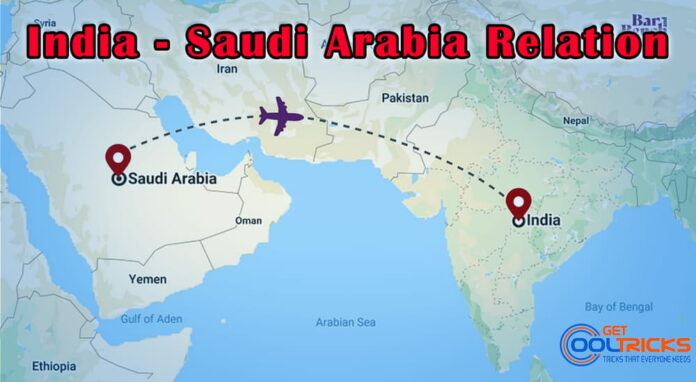India-Saudi Arabia Strategic Partnership Council
India- Saudi Arabia Relation PDF
Saudi Arabia’s Crown Prince and Indian Prime Minister have recently co-chaired the first summit-level meeting of the India-Saudi Arabia Strategic Partnership Council (SPC).
About India-Saudi Arabia Strategic Partnership Council (SPC):
- It was set up in 2019 to establish a high-level council to steer the Indo-Saudi relationship.
- Saudi Arabia has formed such partnerships with the UK, France, China and India.
- Two main pillars:
- Committee on Political, Security, Social and Cultural Cooperation
- Committee on Economy and Investments.
- SCP came just after the announcement of the India-Middle East-Europe Economic Corridor (IMEC).
About India-Middle East-Europe Economic Corridor (IMEC):
- It is an Eastern Corridor, connecting India to the Gulf region and a Northern Corridor connecting the Gulf region to Europe.
- It will include a railway and ship-rail transit network and road transport routes.
- It is signed by India, the USA, Saudi Arabia, UAE, the European Union (EU), Italy, France and Germany.
Key highlights of the meeting
- Implementation of the $50-billion West Coast refinery project, and identified energy, defence, semiconductor and space as areas for intensified cooperation.
- Agreement to diversify the current status of their hydrocarbon relationship into a “comprehensive energy partnership” and signed pacts to boost cooperation in areas of digitisation and investment.
- Areas of cooperation such as energy, defence, security, education, technology, power grid, gas grid, optical grids, fibre networks, transportation, healthcare, tourism and culture were identified in the talks.
- The SPC has two main pillars:
- Committee on Political, Security, Social and Cultural Cooperation; and
- Committee on Economy and Investments.
- Both sub-committees have four functional levels of engagement:
- Summit level (Prime Minister & Crown Prince);
- Ministerial-level;
- Senior Officials’ Meetings; and
- Joint Working Groups (JWGs).
- The JWGs under the Political committee are
- Political & Consular;
- Legal & Security;
- Social & Cultural; and
- Joint Committee on Defence Cooperation.
- The JWGs under the Economic Committee are
- Agriculture and Food Security;
- Energy;
- Technology & Information Technology; and
- Industry and Infrastructure.
Trade and economic relations
Saudi Arabia is India’s fourth largest trade partner (after China, the USA, and Japan) and a major source of energy as India imports around 18% of its crude oil requirement from the Kingdom.
- Saudi Arabia is India’s second-largest crude oil supplier (Iraq has been India’s top supplier).
- Saudi Arabia is also a significant source of LPG for India.
- Major exports from India to Saudi Arabia are: Cereals, Spices, Machinery, Iron or steel products, Organic chemicals, Meat, Vehicles, Ceramic products, electronic equipment, and Clothing (not knit or crochet).
- Major imports from Saudi to India: Oil, organic chemicals, plastics, fertilizers, gems, precious metals, aircraft, spacecraft, inorganic chemicals, aluminium, copper, and other chemical goods.
Other proposed major investments include:
‘West Coast Refinery & Petrochemicals Project’ in Maharashtra, which is being jointly built by Saudi Aramco, Abu Dhabi National Oil Company, and an Indian consortium, which includes Indian Oil Corporation, Hindustan Petroleum Corporation, and Bharat Petroleum Corporation.
In the renewable energy sector, Saudi Company Al- Fanar has a controlling stake in 600MW Wind Power projects in India.
Saudi Aramco is also discussing with Reliance Industries to acquire a 20% stake in its oil-to-chemicals business.
Cultural relations
In 2021, an MoU on Yoga Cooperation was signed between the Saudi Ministry of Sports and India’s Ministry of AYUSH, which paved the way for the establishment of formal Yoga standards and courses in the Kingdom, marking the first time such standards were implemented by any country in the Gulf region.
Approximately 2.2 million strong Indian community is the largest expatriate community in the Kingdom.
The annual Hajj pilgrimage is another important component of Indo-Saudi bilateral relations.
- In 2019, it was announced that India’s Hajj quota would be increased by 24,975 in 2019, enabling 2,00,000 Indians to perform Hajj in August 2019.
- India has also digitized the Hajj process by providing the Hajj mobile app, health facility – e-MASIHA, e-luggage pre-tagging, and linking the HGOs (Hajj Group Organizers) with the digital system, which has simplified the procedures for pilgrims.
Strategic Partnership Council
The Strategic Partnership Council was instituted in October 2019 during the visit of the Prime Minister of India to the Kingdom of Saudi Arabia and has two main pillars:
- Political, Security, Social and Cultural Committee
- Committee on Economy and Investments
Outcomes of the meeting:
- Streamlining efforts to realize Saudi’s investments worth USD 100 Billion in India.
- Endorsement of the 41 areas of cooperation identified by the technical teams under the 4 broad domains of Agriculture & Food Security; Energy; Technology & IT; and Industry & Infrastructure.
- Agreement to undertake the implementation of the priority projects in a time-bound manner.
- Priority areas of cooperation include:
- Collaboration in the digital fintech sector through the operationalization of UPI and Rupay Card in the Kingdom of Saudi Arabia.
- Re-affirmation of continued cooperation in joint projects including the West Coast refinery, LNG infrastructure investment, and development of strategic petroleum storage facilities in India.


